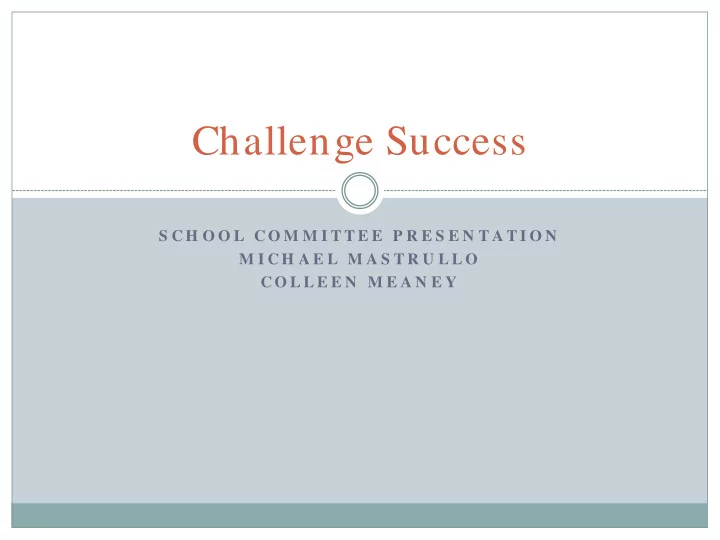

Challenge Success S C H O O L C O M M I T T E E P R E S E N T A T I O N M I CH A E L M A S T R U L L O CO L L E E N M E A N E Y
Effort • Hard work is more important than talent • Hard-work is more important than intelligence cc: earthkath - https://www.flickr.com/photos/22224537@N02
Grit • Not to abandon tasks in the face of obstacles! • Perseverance • Tenacity • Doggedness • Persistence cc: pigpogm - https://www.flickr.com/photos/55672723@N00
Growth Mindset • "Whether you think you can, or think you can't, you are right." (Henry Ford) cc: earthkath - https://www.flickr.com/photos/22224537@N02
Balance cc: DanieleCivello - https://www.flickr.com/photos/74302553@N00
Enjoy the journey! cc: Stuck in Customs - https://www.flickr.com/photos/95572727@N00
Happiness cc: HckySo - https://www.flickr.com/photos/54191388@N00
Learning Environment COM P AS S I ON ATE LY D E M AN D I N G & • S U P P OR TI VE LE AR N I N G E N VI R ON M E N T
Core Values & Beliefs Com m itted to excellence in and out of the classroom , the CCHS community believes that it is our mission to inspire our students from Concord, Carlisle and Boston to strive for and m eet high levels of academ ic and personal achievem ent.
Core Values & Beliefs We believe that the respectful, supportive, and engaging learning environment at CCHS instills intellectual curiosity, a passion for learning , as well as an understanding of one's role in the community and in a diverse global society.
Why Challenge Success Our new partnership with Challenge Success, of Stanford University, comes from three places: (1) a recommendation from last year’s Homework Committee (2) the positive response to our speaker, Julie Lythcott- Haims, who surfaced a number of areas of students’ stress and who talked with parents about How to Raise a Successful Adult (3) feedback from the Parent Survey highlighting student stress, the impacts of homework, extracurriculars, and more
What Challenge Success is about Challenge Success, “provide[s] schools and families with the information and strategies they need to create a more balanced and academically fulfilling life for their kids. ...Effective change happens when all stakeholders— administrators, faculty, parents, counselors, and students— come together to identify problems and work on solutions.”
What Challenge Success stands for Data from Challenge Success’s work with other high schools over the last ten years shows that academic achievement remains high while they partner with schools to strengthen students’ “ability to be independent, adaptable, ethical, and engaged critical thinkers,” and “foster learners who are healthy, motivated, and prepared for the wide variety of tasks they will face as adults.”
CCHS Challenge Success Vision Concord Carlisle High School is a community united in support of students’ engagement and well-being. We consciously commit: To spark curiosity and excitement for the journey of the high school experience To encourage balance, personal growth, and academic excellence To value student voice in a respectful and compassionate community To foster a community that actively challenges and redefines success to support students’ individual well- being
CCHS Survey Data: Extracurricular Activities & Stress 61% School sports 40% Community service 35% Club sports 32% School clubs 21% Performing arts 14% Religious organizations 11% Visual arts 5% Student government 5% Advisory Leader 4% Journalism and literature
Academic Engagement 46% of students said they “do school”: they often or always work hard, but rarely if ever, find their school work interesting, fun, or valuable 28% of students report working hard on their school work and finding their schoolwork meaningful.
Student School Stress & Academic Worries 73% of students reported they were often or always stressed by schoolwork 60% of students reported that schoolwork often or always kept them from having time with family or friends 67% of students reported that schoolwork often or always kept them from getting enough sleep 48% of students have felt forced to drop an activity because of the amount of schoolwork they have
Average hours of sleep by grade level on a typical school night
Student health & well being In the month prior to the survey: 48% of students reported that a stress-related health or emotional problem cased them to miss more than a day of school. 52% reported that a stress-related health or emotional problem caused them to miss a social, extracurricular or recreational activity more than once in the part month Approximately 37% of students surveyed experienced exhaustion, headaches and difficulty sleeping in the past month (see Figure 8 for percent on all physical problems related to stress and Table 8 for percent by grade).
Multi-tasking v. uni-tasking Students were asked how they felt about the amount of homework they had each night. 56% reported they had “too much” homework 43% felt they had the “right” amount of homework Students were also asked what else they do while doing homework: 64% Listen to music 57% eating (dinner or snack) 51% texting (including Snapchat), chatting, etc.. 32% emailing 28% watching TV, YouTube, Netflix 28% are on Instagram or other social networking sites 25% talking to family or friends in person 19%talking on the phone, FaceTime, etc.. 12% are just doing homework
Recommendations to students on opening day: What we can do to support each other Text / social media free (or lighter) time from 7- 9 pm Uni-task – do one thing at a time and see what happens with your efficiency Permission to get more sleep Kindness and encouragement
Challenge Success Steering Committee Priority Areas, as derived from root cause analysis: Extracurriculars Homework Student Engagement
Recommend
More recommend